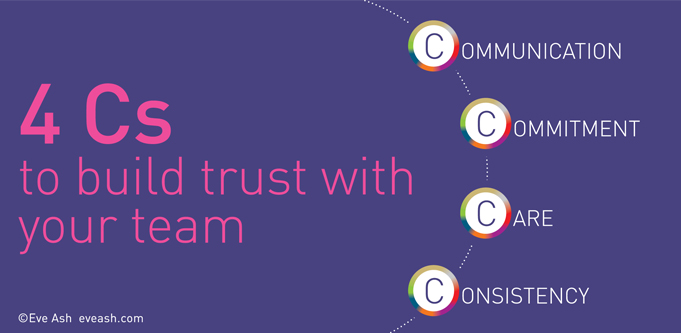It isn’t hard to ensure cooperation and trust in a team. Some team leaders don’t need to be told because this all comes naturally.
Here are four simple Cs to help you build trust with your team:
 1. Communication
1. Communication
Be open and honest – because secretiveness is the quickest route to distrust. You know how it feels when important information, relevant to you, has been withheld? So, set the tone accordingly. Make sure communications are timely; that is, not simply generated on time, but done sensitively and with awareness of the ramifications.
Good communications cannot exist without agreed ground rules; “democracy is a conversation” (so the saying goes) and fruitful conversations happen in relatively safe spaces. Be mindful that you’re speaking with and not merely to or at people; ask for their feedback and show (by your actions) you’ve taken what’s said on board.
2. Commitment
No-one likes empty statements and after a while, they tune out good intentions if the only route they lead to is broken promises and disappointments. If you say you will read and comment on something before the end of the week, schedule it and deliver. If you made a rough note to do something for someone, make it a concrete action.
Follow up and follow through. Keep promises and demonstrate how they will be kept. This may call for good time management. Seeing first-hand what is being done not only showcases but generates commitment. That’s a vital building-block of trust.
3. Care
Be supportive of those you work with. Everyone appreciates care but care doesn’t necessarily mean appearing at a person’s side with tissues and holding their hand tightly. But it does mean reading people’s cues and being there for them if and when requested.
Caring can mean anticipating special needs, sensing what kind of support to offer or giving people space or forgiving hasty or angry words if you know the pressures that prompt them. Communication and care work hand in glove here, because when the crisis is over, you can talk matters over.
Where possible, help beyond your role (for example, offering to take on a little extra, hiring a van to help with removals, or arranging nice food if someone’s working late). If you’ve been asked to keep confidences, make a point of doing so.
4. Consistency
Consistency in our actions and words gives reassurance. Being moody at any time is undesirable. Walk the talk (otherwise the values you profess are meaningless); ensure that you deploy the same rules for yourself as others. Maintain day-to-day consistency; unpredictability and moodiness are a pain for the majority of us and merely breeds wariness.
Unreliable performers are soon shown the door. People and products thrive on consistency; if there’s no trust in teams, there will be little in the way of consistency.
Rolling out the four Cs builds trust and improves cooperation. It applies in every situation conceivable, ranging from marriages to short-term projects. Smart companies breed trust. Leaders need to ensure this is part of the culture.
Eve Ash is a psychologist, author, filmmaker, public speaker and entrepreneur. She runs Seven Dimensions, a company specialising in training resources for the workplace. See the rest of Eve’s blogs here.
 1. Communication
1. Communication

COMMENTS
SmartCompany is committed to hosting lively discussions. Help us keep the conversation useful, interesting and welcoming. We aim to publish comments quickly in the interest of promoting robust conversation, but we’re a small team and we deploy filters to protect against legal risk. Occasionally your comment may be held up while it is being reviewed, but we’re working as fast as we can to keep the conversation rolling.
The SmartCompany comment section is members-only content. Please subscribe to leave a comment.
The SmartCompany comment section is members-only content. Please login to leave a comment.